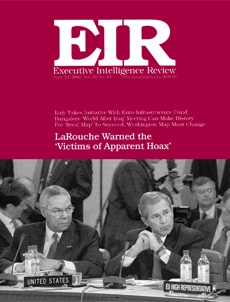The Henry Waxman Letter: Who Knew What, and When?
by Jeffrey Steinberg
Rep. Henry Waxman (Calif.), the ranking Democrat on the House Government Reform Committee, sent a letter to President Bush on June 2, demanding a full explanation from the Administration, as to why senior officials, including Vice President Dick Cheney, Defense Secretary Donald Rumsfeld, and the President himself, “cited forged evidence about Iraq’s efforts to obtain nuclear materials.”
Documentation: The Waxman letter, and the State Department’s reply.
British MP Tam Dalyell: We’re Looking to Congress
‘Powell Apparent Victim of Hoax’
by Lyndon H. LaRouche, Jr.
We republish this Feb. 9 warning memorandum by Lyndon LaRouche, circulated nationally as a mass leaflet by his Presidential campaign committee, in the aftermath of Secretary Powell’s infamous speech to the UN Security Council.
Economics
Italy Takes the Initiative for European Infrastructure Growth
by Claudio Celani
The Rome government will propose, when it begins its semester as European Union chair on July 1, that EU member-states’ spending for infrastructure be exempted from the budget deficit limits, and therefore not regulated under the Stability Pact.
The Present and Future of Nuclear Knowledge
by Dr. Chang-kun Lee
The author, who is a Commissioner on the Atomic Energy Commission of South Korea and former chairman of the International Nuclear Societies Council, calls on the nuclear community to “take up the gauntlet” and move nuclear technology forward for the benefit of mankind—from desalinating water, to transmuting waste, and new methods of steelmaking.
Question Circulates: ‘Economic 9/11’ Coming?
by Marcia Merry Baker
Bureau of Labor Statistics Fraud Excludes Reality
by Richard Freeman
TVA in Borneo: Bakun Dam Revived
by Martin Chew Wooi Keat
India Gives German Industry Options
by Rainer Apel
Business Briefs
Feature
Bangalore Conference Will Change World History
by Mary Burdman
Part 2 in our coverage of the impact of the international conference “World Situation after Iraq War,” held in Bangalore, India on May 26-27, by India’s Centre for Social Justice and the Schiller Institute.
Build Economic Recovery and Peace Upon Universal Principles of Culture
by Helga Zepp-LaRouche
Speech by the chairwoman of the Schiller Institute.
Bangalore Declaration: ‘Toward a New World Order’
‘Let India Set a Lesson to the World’
by Chandrajit Yadav
Speech by the chairman of the Centre for Social Justice.
‘The Issue by 2004 Will Be the World Economy’
A press conference of Lyndon H. LaRouche, Jr. and Helga Zepp-LaRouche in Bangalore on May 24.
Indian Press Highlights LaRouche on the Economy
Indications of the wide national coverage of the conference in the Indian media.
Auspicious Hour for Change at Bangalore
by Ramtanu Maitra
International
‘Road Map’ Begins in Mideast, But Must Change Washington Map
by Dean Andromidas
Can one part of the Bush Administration organize peace between Palestine and Israel, while another is leading an unjust occupation in Iraq and is calling for “regime change,” if not war, in Iran, Syria, and Saudi Arabia?
Iraq WMD Flap Has ‘Mortally Wounded’ Blair
by Mark Burdman and Alan Clayton
Vietnam Taking Rightful Place in the World
by Michael Billington
Regional Powers Seek Afghanistan’s Stability
by Muriel Mirak-Weissbach
There is good reason to believe that the awesome task of stabilizing the country is being assumed through a new approach by neighboring countries, with western European help.
International Intelligence
National
FCC Deregulation Is a Threat to U.S. National Security
by Edward Spannaus
On the day before the Federal Communications Commission voted for further deregulation of the nation’s broadcast and print media, Democratic Presidential pre-candidate Lyndon LaRouche warned that this deregulation scheme must be stopped, on the grounds that it is a threat to U.S. national security.
Rupert Murdoch and the Imperial Disease
by Anton Chaitkin
Conrad’s ‘Black Hole’ Puts Hollinger in Red
by Michele Steinberg and Scott Thompson
National News
Reviews
Frederic Remington’s Little Dark Age
by Steven Carr
“Frederic Remington: The Color of Night,” an exhibition at the National Gallery of Art, Washington, D.C.
Departments
Report From Germany
by Rainer Apel
India Gives German Industry Options.
Editorial
Stopping the Genocide.
Corrections
In last week’s issue, the article on “Krafft Ehricke’s Mission to Mars,” pp. 14-15, gave the wrong e-mail address for the Krafft Ehricke Institute. The correct address is krafftehrickeinst@sbcglobal.net.
Dr. Areti Demosthenous, whose speech to the Bad Schwalbach conference we published in our May 9 issue, was not correctly identified. She is Director of the Institute of Historical Research for Peace, Visiting Lecturer at the Department for Turkish Studies, University of Cyprus, Nicosia. Cyprus.



